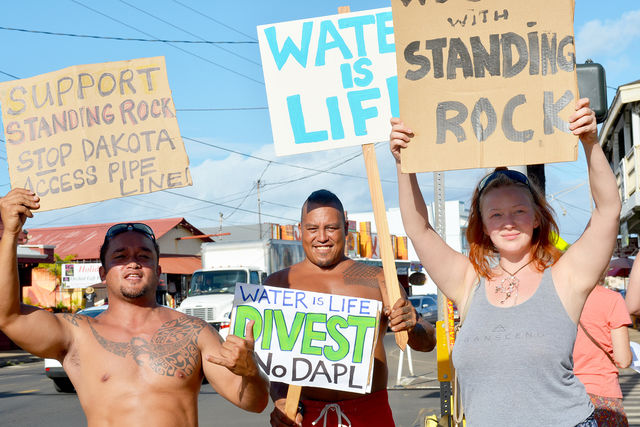KAPAA — Six people either closed or pulled most of the money out of their accounts at the Kapaa branch of First Hawaiian Bank Wednesday and another group is planning to do the same at the Lihue branch next Wednesday.
KAPAA — Six people either closed or pulled most of the money out of their accounts at the Kapaa branch of First Hawaiian Bank Wednesday and another group is planning to do the same at the Lihue branch next Wednesday.
The action is in protest of the construction of the Dakota Access pipeline project, a 1,172-mile, 30-inch oil pipeline which would transport crude oil from fields in North Dakota through South Dakota and Iowa, and into Illinois.
Representatives from First Hawaiian Bank said the bank isn’t involved in the Dakota Access pipeline project, even though a large shareholder in the company has surfaced as an investor.
“First Hawaiian Bank has no involvement with the Dakota Access Pipeline. While BNPP is a significant shareholder of First Hawaiian Bank, we have many shareholders as a publicly traded company. First Hawaiian Bank was founded on the value of giving back to the community,” said Susan Kam, spokeswoman for the bank. “Today we are one of Hawaii’s largest corporate givers of time and resources.”
The pipeline is funded by 38 major banks and financial institutions, according to the results of an investigation by research company LittleSis; including Bank of America, Wells Fargo, JP Morgan Chase and other financial institutions have worked together to extend a $3.7 billion credit line to Energy Transfer Partners.
A significant part of First Hawaiian Bank is owned by BNP Paribas, an international bank that’s popped up on that list of banks heavily invested in the project. So now it’s one of more than two dozen banks that are the target of efforts to stop the pipeline’s construction.
“We’re standing in front of the bank and holding signs to raise awareness that the owner of FHB is invested into the partners that are building the DAPL pipeline,” said Sonja Kass, the woman who instigated Wednesday’s demonstration.
Kass closed her account with First Hawaiian Bank on Wednesday.
Standing up for his personal beliefs was the driving factor for John Smith, who also closed his account at the Kapaa Branch of First Hawaiian Bank.
“I support anyone who stands up for what they believe in, even if it’s not what I believe in,” Smith said.
According to Energy Transfer Partners, L.P., a Texas-based company which is proposing the project, the pipeline is expected to transport 470,000 barrels per day, with the capability of transporting 570,000 barrels daily.
The entity says the pipeline would generate $156 million in sales and income taxes alone during construction phase, and annually the pipeline is expected to generate $55 million in property taxes to the states of North Dakota, Iowa and Illinois.
The people of the Standing Rock Sioux tribe in North Dakota are working to stop the construction of the pipeline, claiming it will threaten the reservation’s water supply.
“Water is life and First Hawaiian Bank and many other banks directly fund the Dakota Access pipeline,” said Mahana Vaughn, who shut down her account Wednesday. “This pipeline is a desecration of all that is sacred.”
Accompanying the people who closed their accounts were about 20 others, who held signs in front of the bank.
Kass created Wednesday’s event after returning from three weeks at Standing Rock, from Nov. 2 – Nov. 23, where she joined the protesters, who now call themselves water protectors, in building yurts.
She said it was a sense of compassion for the people involved, as well as a need to protect natural resources, that drove her to the camp.
“I felt so strong that I felt the need to go there and be there myself and help,” Kass said.
Kass eventually had to return home. She said the only thing she could do to continue to help the effort was to remove her account with an organization that’s invested in the project.
“Just because they’re Native Americans, their graveyards and prayer sites are not being valued,” Kass said. “And it really needs to stop and it made me feel good to do something about it and I wanted to continue that.”


